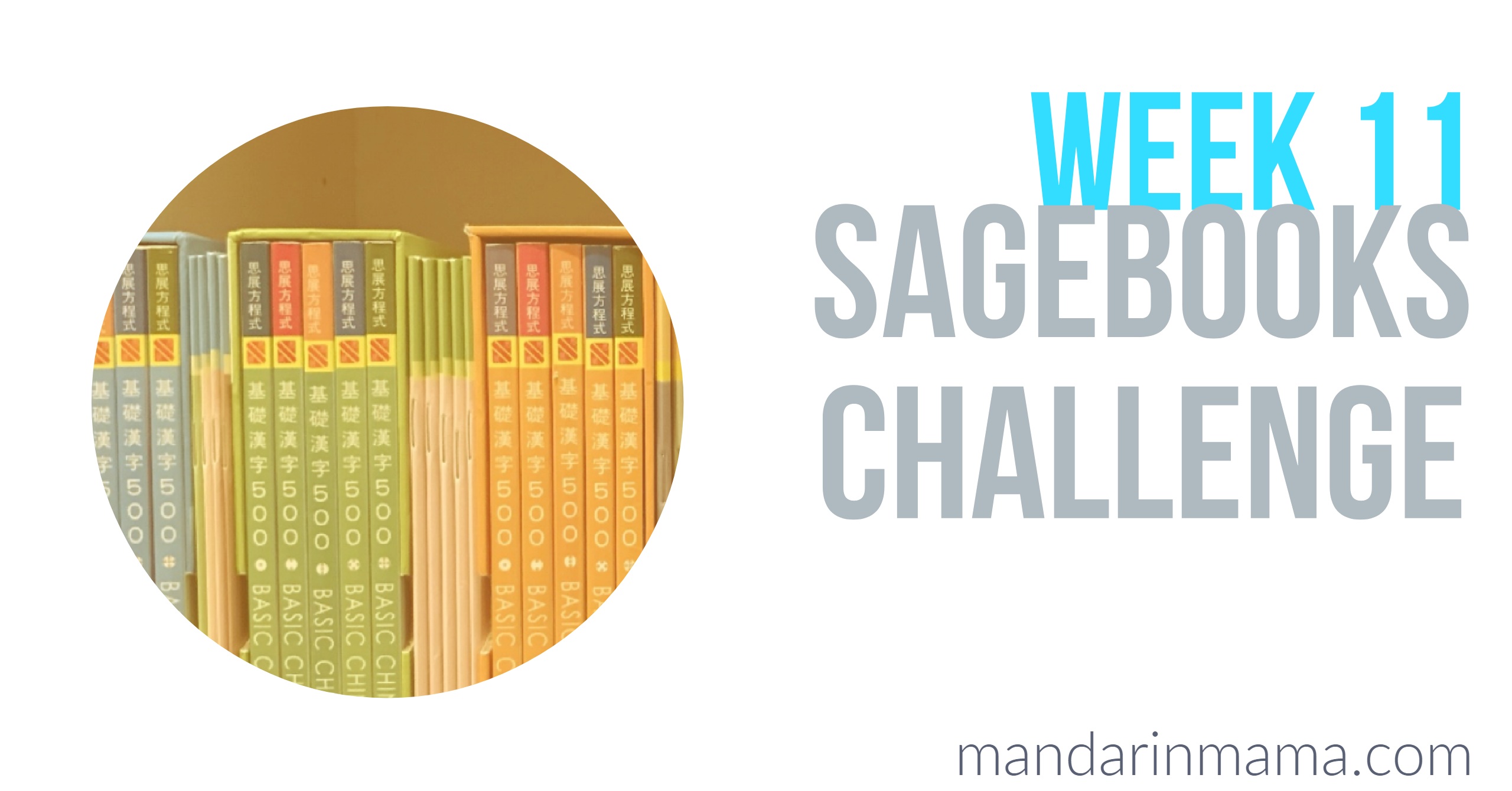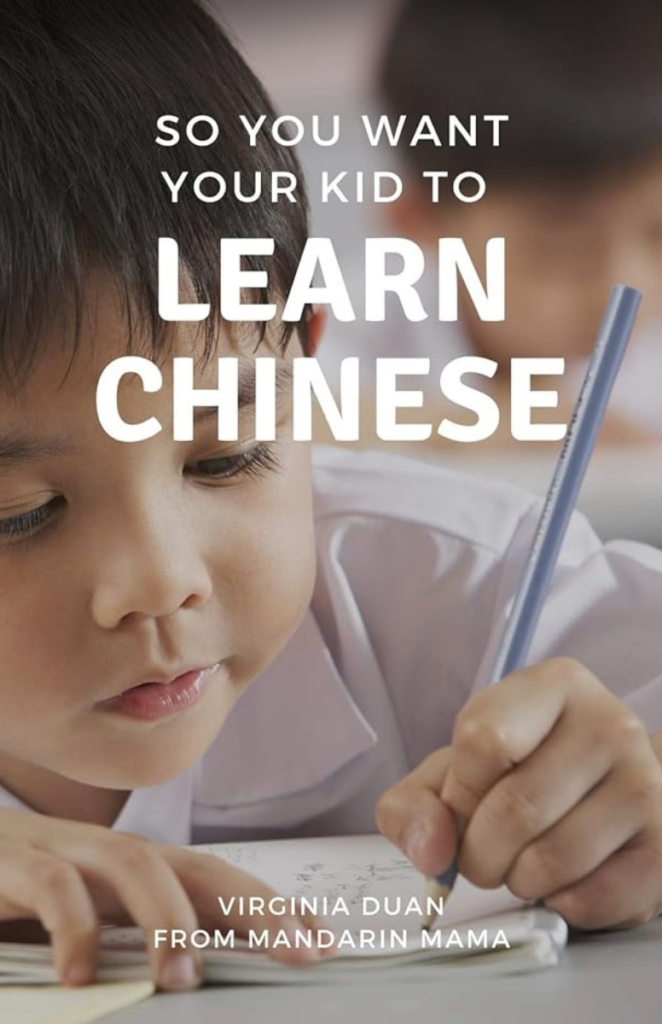
This post was sponsored by Sagebooks. There are also affiliate links. All opinions are mine and mine alone.
When my oldest child was born nine years ago, I did not expect that my desire to teach him Chinese would take over our lives and drastically change my career, my education choices, and my friends.
Honestly, I just assumed I would follow in the footsteps of my parents. After all, I was fluent in speaking and comprehension. I could read zhuyin and a decent number of Chinese characters despite not being actually literate.
Nope.
Instead, I somehow got sucked into this ridiculous idea that my children could be both bilingual and biliterate and the way that I should do it is by bilingual homeschooling. For an extremely lazy person (I prefer efficient), this was not the way I foresaw my life to be.
Fast forward almost a decade and I’ve been writing about Chinese and teaching kids Chinese on an almost weekly basis for four years now.
FOUR.
At a weekly pace of approximately 700-1000 words a piece, that’s around 200+ posts for a total of approximately 200,000+ words. I even wrote a book, So You Want Your Kid to Learn Chinese, with extra chapters and an Action Plan and that was also a bunch of words and stuff.
As you can imagine, sometimes, the burn out is real.
Sometimes, I’m really fucking bored and sick of talking about Chinese – let alone teaching it to my children.
In fact, even though Chinese is the language of my birth, family, and heritage, it’s not the language of my dreams, heart, or brain. It takes enormous effort for me to sustain the constant flow of Chinese. To always feel as if I cannot appropriately express my feelings and complex thoughts. (I mean, I’m a deep thinker, folks.)
You don’t have to be on the same level of Chinese intensity as me to feel the same way. Perhaps you’re a smidge more polite about it.
Perhaps Chinese is actually your native language and it’s no hardship to speak and think in it. But perhaps you’re also tired of trying to get your children to speak and respond in the language of your heart rather than your adopted language. Perhaps you, too, are weary of trying to communicate in a language where you have half your vocabulary cut off from you and would like for your kids to truly know your thoughts in the words of your dreams because you, too, are a deep thinker.
Whatever the reason, burn out is a real thing.
Whether you’re burned out on talking/reading/writing/researching about Chinese acquisition or its execution (and the cost of it both in terms of time and resources), you have plenty of company.
You’re not alone.
So, what do you do if you can’t Chinese anymore? Allow me to offer some suggestions in the spirit of community, comradery, and friendship. (FRIENDSHIP!!)
1) Take a break.
Whatever that looks like for you, do it.
Just like cheat days (or vacation eating), you can do the same for Chinese. It doesn’t have to be a wholesale moratorium. You can still speak Chinese. You can still do the things that don’t bug you (especially if it’s already ingrained in your family life).
But maybe you don’t have to read any more language acquisition articles. Maybe you don’t have to research more Chinese books for kids. Maybe you don’t have to be in Facebook or reddit groups for a day or two or fifty.
Maybe, you don’t have to read any more blogs. (Actually, scratch that. That’s a terrible suggestion. You need all the blogs.)
Maybe you don’t harp on the kids to speak Chinese today. Maybe you let them take a few days off of reading Chinese or doing their homework. (Is someone going to pull my Asian Card?) Maybe you remove all your Chinese CDs from the car and load in all your BTS CDs instead so even though there is no Chinese stuff at least it’s Korean and not English.
Maybe you overdose on all things English and afterwards, in a fit of guilt, you cram as much Chinese into your kids’ brains as humanly possible.
Maybe you don’t go to Taiwan or China this year for the purpose of Mandarin Immersion. Maybe you make them watch Chinese DVDs in the car as you go on a tour of national parks instead.
All of these things will be here when you decide you want to go back. Then you can either binge and cram everything you missed or you can let it go. (I suggest you let it go. Unless it’s my stuff. You should binge-read my stuff and weep that you did not get a chance to read it in real time.)
2) Find your tribe.
Find you a group (or several) of humans who have similar Chinese goals as you do. They don’t have to be exactly the same – but close enough for government work.
Just like all support groups for difficult endeavors, having a bunch of folks who are on the same wavelength and want the same things as you do is, at its best, encouraging and supportive. Personally, I look for some folks ahead of me to light the way, folks next to me to walk beside, and folks behind me to lead and guide.
It’s nice to commiserate with fellow parents who understand your unique pain and suffering. Plus, it’s lovely when you brag about Chinese stuff and people are happy for you and cheer you on. And when you’re burned out, these same people can provide a safe place to land.
Of course, like all things in life, there can be mean people. But in general, I have found that if you stay out of drama and ignore the bad apples, most people are well-intentioned. Plus, you don’t have to hang out with the people you don’t like; hang out with the folks who make your life better.
Life is hard enough.
Here are some places that I have found kindred spirits in this Chinese journey (make sure you follow the rules for membership approval):
Raising Bilingual Children in Chinese and English (Disclosure: I am one of the admins to this group. ANSWER ALL THE MEMBERSHIP QUESTIONS.)
Sagebooks HK Parent Support Group (Disclosure: I partner with Sagebooks to admin this group on their behalf.)
Bilingual/Multilingual Families in the US
Mandarin Immersion Parent Support
美國在家自學的雙語家庭 Chinese-English Bilingual Homeschoolers in America (Please only join if you actually homeschool your child. This is not the same as you teaching your child Chinese at home.)
3) Find your WHY.
In other words, re-evaluate your reasons for teaching your children Chinese. Often times, we get caught up in the day to day activities instead of holding our end goals in mind. And too often, we forget WHY we want these end goals in the first place.
To go back to the weight example, if you think only of deprivation and exercise, that will make you sad and give up. However, if you think of what foods you CAN eat, the benefits of exercise, and that you’re doing this for your health so you can live long enough to see and be with your future grandchildren, then that’s the TRUE WHY you are trying to lose weight. (And perhaps, you are also semi-shallow and want to look hot in a bikini. You can have layers.)
So, WHY do you want your children to learn Chinese?
For me, it’s a combination of desire and rage.
I still have family that only speak Chinese and I want my children to be able to communicate with them. I still remember the language gulf between me and my maternal grandmother. She only spoke Taiwanese and I could only speak Mandarin or English. I have never had a conversation with her the few times I met her and she passed away in 2012 so I will never get another chance.
It hurts me to this day.
I also never want my children to feel as if they’re not really Chinese just because they are multi-racial. I never want someone to say they’re not American or Chinese enough. So I want their Chinese to be so good that it takes several conversations before native speakers figure out that my kids are NOT native speakers.
I have felt the pain of not speaking or reading Chinese well enough to qualify as “Chinese enough.” It is frustrating and infuriating and I will be damned if my children are ever made to feel that way. Especially since I have the means to prevent it.
These are MY whys and what I return to when the prospect of decades of Chinese immersion exhausts me.
What are you whys? And are they enough to sustain you?
4) Stop.
Yes. Quitting is a valid option.
Why?
Because sometimes, our whys are not enough.
Sometimes, there are other things we value more than Chinese fluency or literacy. You never know what life will throw at you or how your priorities will change.
Be flexible.
Allow yourself an out.
Chinese is not the only thing in the world. It’s not even remotely the best thing in the world. Your children will still have fruitful, fulfilling, wonderful lives even if they do not end up speaking, understanding, reading, or writing Chinese.
It sounds blasphemous, but it’s true.
Give yourself the freedom to stop.
Plus, until our last breath, we don’t know if the stop is a hiatus or a permanent cessation. There is no true deadline or finish line to cross. Fluency is ever-evolving because language is always changing.
You do not know what lays in the future language-wise for your children (or for yourself). And what a gift that is!
Ultimately, we want our children to grow up and live good lives. Hopefully, you can also live a good and happy life while raising them, so if Chinese helps with that, fantastic! However, if it doesn’t, there is no shame in changing your mind and adjusting to your new circumstances.
Ok. I can’t figure out how to end this article. And thus, 加油/jia you2/add oil (ie: YOU CAN DO IT!)/ will have to suffice.
加油!!







